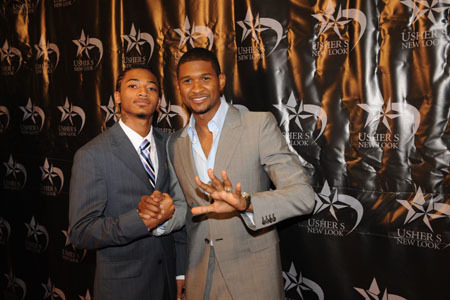Millions of music fans know Usher (Usher Raymond IV) as a phenomenal performer who has captivated the music scene for 15 years. With five Grammy Awards, eight Soul Train Music Awards and 17 Billboard Music Awards, Usher was recently nominated for five American Music Awards (public voting here) and continues to dominate the music landscape.
But behind the fame and fortune, there is another side to Usher that often gets lost in the spotlight.
Usher's New Look
Entrepreneur, philanthropist and youth leader are not the labels that come to mind for legions of fans that religiously follow Usher, buy his music, attend his concerts and keep up with events in his life through entertainment media.
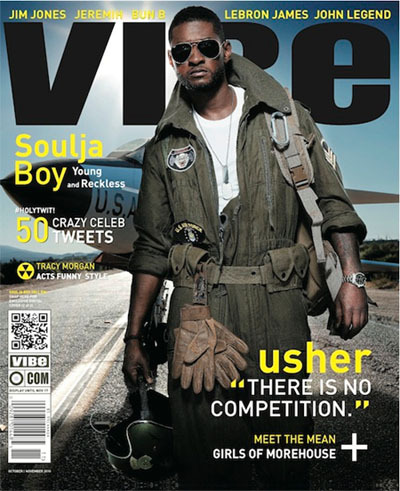
Usher is featured on the cover of Vibes' Oct/Nov issue.
But Usher's New Look Foundation is where he is reaching youth and changing lives. Employing a process of authentic engagement with youth in the inner cities of several major U.S. cities, the 11-year-old New Look Foundation introduces a foreign concept to teens caught up in the perception of insurmountable challenges of life: a pathway to success through social entrepreneurship and leadership.
Principled Leadership
New Look is built upon four principles that Usher has epitomized throughout his career: Business / Entrepreneurship; Civic Engagement; Education; Talent and Creativity. In addition to his musical career, Usher is part owner of the Cleveland Cavaliers, has produced a successful fragrance and serves as a mentor to youth in the leadership academy at his New Look Foundation.
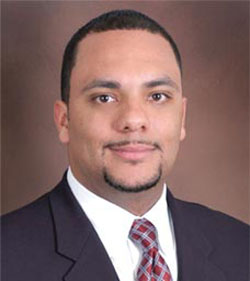
Shawn Wilson, CEO
Usher's New Look Foundation
"Ultimately, New Look isn't a celebrity foundation," says Shawn Wilson, the 36-year-old CEO who has managed the success of the organization since 2005. "It's a nonprofit organization that was founded by an entrepreneur and a philanthropist."
A current annual budget of $2 million has bolstered efforts to change the lives of youth by introducing new paradigms and business concepts that capitalize upon their talents, creativity and passion. Reaching more than 8,500 inner city youth with an innovative message and ongoing wraparound life engagement that has transformed hardcore gang bangers into hardcore entrepreneurs and community leaders, Usher's New Look has already expanded into countries like Kenya and the Philippines.
OMG!
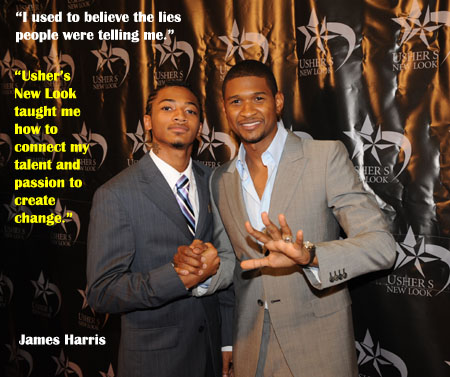
But look no further than Kansas City, Kansas to find the tremendous impact the foundation has made.
James Harris is one of Usher's New Look youth leaders and perhaps one of its main superstars. Usher's hit song "OMG" is a hot-selling commodity, but it is Usher's New Look Foundation that dramatically transforms the lives of youth like James.
Today, 21-year-old James sits on the board of Usher's New Look Foundation. He leads community projects funded by micro-grants, helps his friends in "the 'hood" find jobs, and runs his own business. He has testified before Congress and traveled to the Philippines as a youth ambassador.
But just a few years ago, when James was recommended for New Look by Kathleen Cochran and Sue Rollins at J.C. Harmon High School, he was at a crossroads.
From Street Hustler to Community Leader
James Harris tells his story:
Q: How did you get involved with New Look?
A: I was at a tipping point in my life where it was going to be to the extreme for the negative or extreme for the positive. Either I was going to go all the way in, or I was going to have to come all the way out.
I grew up in Kansas City, Kansas in the Wyandotte County area, a.k.a. "the 'hood." I have several brothers and one sister, but one full-blooded sibling. That's my brother, John Harris. That's who I grew up with.
My mama knew there would be a problem with my father's lifestyle and me being raised around it. For the longest, she really kept me away from my father knowing he wasn't good for me. But, you know, as boys get older ... I wanted my father more and more. But she was always trying to counter whatever I picked up from him.
She was always telling me, 'Don't be like your father. Just work. Work like me.'
My mom, Francine Harris, is a very hard-worker. I grew up seeing my mama work three jobs, struggling to hold the family up. It was just me, her and my little brother. When she was at work I had to take care of my little brother. So, around seven and eight years old, I was taking care of my little brother while mom was at work.
My mama is the foundation of my work ethic. I always tell people I get my hustle from my daddy but I get my work ethic from my mom. And I just combine both of them. I learn from each and every side of my family. I took that hustle, but flipped it into a positive way.
In high school (J.C. Harmon) I was involved in this other program for entrepreneurs, YEK (Youth Entrepreneurs of Kansas) and there were two teachers who taught that class that I was really close to (Kathleen Cochran and Sue Rollins). Some marijuana fell out of my pocket at school and they saw it, but didn't tell me they had picked it up.
They turned me in.
I felt betrayed. My favorite two teachers found that weed and just turned me in.
But what I didn't know was they were helping me. They were looking out for me. They weren't just viewing me as some troubled teen that needs to do some time. I didn't get expelled because I had good grades and all my teachers made good comments about me. They saw that I was intelligent and wanted better. But I was just in a bad place. So they recommended me for New Look.
Q: Before you were recommended, had you heard of New Look?
A: I didn't even know Usher had a foundation. I hadn't heard much about any celebrity foundation.
I didn't know anything about it until they told me and pulled up the website. I read through the links and thought, 'This is what's up!'
Avoiding Dream Wreckers
Q: So you were recommended. Then what happened?
A: I had to compete with every other kid in my school district who was recommended for the program and wanted to go ... and everybody wanted to go. I had to write essays and give interviews and presentations. After all of that, I was selected.
I was kind of skeptical because I had never been on an airplane. They were talking about flying me to Atlanta. They told me I would go to a camp and be able to do music. I thought that sounded cool.
If it happens.
I didn't think it was going to happen. And there were people around me who were not supporting me positively. They were telling me I wasn't going to make it. I wasn't going to do anything. I was going to stay here. That was somewhat discouraging, but at the same time it motivated me to wish more that it would really happen so I could show people. Because no matter what I'm doing, if I'm doing it right, don't tell me that I can't do anything else; that used to irk me.
I remember one time in high school I made a comment about going to college. My so-called friends laughed at me. They said, "Nigga you ain't going to college. What college you gonna go to?" As though I couldn't do it because of the type of stuff I was involved in. Little did they know; they didn't see my grades in school. I didn't walk around showing my grades.
Life (and death) in the 'Hood
Q: What was the low point before New Look?
A: I believed the lies people were telling me.
Looking at my situation in the inner city where I grew up, I just accepted those things for what they were, not seeing that any change could be made. That was probably the lowest point in my life because I was just accepting the BS that was going on around me. And not only accepting it but being a part of it.
When you see movies, I tell people it's really like that ... but to the tenth degree. I'm talking about sex, drugs, violence, murder. All of this was taking place in our lives at a very young age.
In the area where we were raised, there were a lot of OGs (original gangster) around. And when I say OGs these are people who have been in the game and they've been doing it for a long time. But they do it differently.
They've got an ethic, code and moral to it even though it is criminalistic behavior going on. There was a lot of honor and code to it. We were raised up like that. We were instilled with the same principles that they practiced.
So, of course, when we grew up we wanted to emulate them.
But the thing about our generation is that we didn't have that order. We didn't stay by the code, so a lot of stuff was crazy. A lot of people were running around robbing each other. A lot of people were running around setting each other up for no reason.
Shooting each other.
Killing each other.
I lost about eight cousins in the span of three months due to things we involved ourselves in through the gang life.
Change is Possible
Q: What prompted a change?
A: There was always a want to change. I just didn't see it as possible.
I was always intelligent. School was never a problem. You learn. You work. You spit back out on a piece of paper whatever the teacher is talking about.
New Look helped me see that I could create change for myself using my own skills and talents. I didn't have to necessarily wait on someone else to come through. It helped to get me out of that victim mentality, like thinking I'm entitled to anything.
I had never been involved with any major program like this before, and they were just so hands on and interested in me. Not only me -- as in what I do -- but me as a person. My life in general, all the way around. They kept me in line for a looong time.
Point of No Return
Q: Tell me about your experience with New Look.
A: When I took that first plane trip I was scared. But I looked at it as I had nothing to lose, but potentially everything to gain. When I got to Atlanta, my mindset was to stick to myself, do my work and connect with the right people. Don't get distracted.
I saw New Look as the one chance; and there won't be anything else after this.
So when I got to the camp, I was working ahead of people. For example, we had to complete a business plan within the two weeks of the camp. But some of the things they were teaching us, I had already learned in YEK (Youth Entrepreneurs Kansas at J.C.Harmon High). So I worked ahead and got three different business plans done.
I created a studio plan for an artist who came through and watched me perform. He made a proposition to me and I had to draw up a plan. I won the Star Camper Award that year and was very surprised by that. Because I didn't really see myself doing anything other than what I should've been doing, which was working.
That first year was very, very serious for me.
Family Support
Q: When you came back home, how was the reception?
A: My mom told me something I didn't know. She said one of the counselors at the camp called her and said they saw great things in me. I wasn't aware there would be any follow-up until they started calling me and showing more interest in me after I came back.
Everybody is really supportive of my music movement because we were doing music before New Look. And everybody in my family has always been supportive of anything that I'm doing, especially if its positive. They always support me. They've been with me on this journey with New Look all the way.
My brother really surprised me. He's very quiet. But, lately he's been showing more interest in being involved in New Look. He is really smart, super technical and computer-savvy. He can break down a computer and build you one out of wood. He is something else.
Mindshift
Q: Tell me about the entrepreneurship ideals you learned from New Look.
A: I went into New Look thinking the key to success was becoming a rapper or being the entertainer.
But when I got into New Look, I found out the entertainer is actually the worker. And not only the worker, but it's a very slim chance for anyone who wants to be in the entertainment industry they are actually going to be in the entertainment industry.
Looking at it realistically, I had to see what else I could do to be in the same area or field I wanted to be in, but not necessarily being an entertainer. I could be a music engineer or an entertainment lawyer.
New Look taught me that knowing the business aspects of the industry strengthens you as an artist. Period.
So, I went from just wanting to be an artist to wanting to be an independent record label owner. I got my business tax ID and invested in a home studio. I've been to home studios and professional studios before. And I wanted it to be the best home studio on the market. And I wanted it to be able to compete with major studios. So, I bought professional equipment but keep my rates low. Because I know how hard it is. As far as being a struggling artist and trying to get a good studio, but at the same time trying to get the best price. But you don't want to sacrifice quality.
In my studio, not only do I record people, but I practice artist development, because I have a lot of new artists that come through. So, I really take time to work with them and help them develop their flow. That's something you will not get at any other studio I know of.
So, my relationship with New Look has been about changing how I was doing things.
Throughout the whole time with New Look I didn't know they were changing my mindset and the way I perceive things.
When you're in a bad situation, you know you're in a bad situation, even if you think you're doing good in the bad situation, you still know it's messed up. So, even when I was doing what I was doing, and I felt like I was doing it right, I knew it was still messed up. Not only that, but I've seen the best people do it and lose. So I had to learn not only from my mistakes but also from the mistakes of others.
New Look taught me how to connect my talent and passion to create change.
Youth Leadership
Q: What do you hope to achieve with what you've learned through New Look?
A: Hopefully, I can do more here in Kansas City, Kansas and get more of my family and friends involved in it.
I've got a lot of different types of friends. Most of my inner circle friends are the people who I grew up with, from the same neighborhood. I'm sad to say that most of my friends are serving time. It's sad to see people still continuing down that path. I try to tell people there are different ways to go about it; we can do it like this. I'm a living testimony.
But a lot of my friends have stopped and come out of the game just because of me. They saw that I went very hard when I was in the streets. But at the same time, when I learned and was exposed to something new, then I went 10 times harder in that direction.
Whatever I learn, I always take it back to the 'hood. I'm teaching them like I was taught. That's one of my principles; to create changes, you have to educate yourself and then educate others. Because it couldn't be enough for just me to learn. A legacy has to surpass yourself.
One other thing I've been doing is helping my friends get jobs to stay out of the streets.
People I know want to work, but it's very hard for them to get jobs because they are convicted felons or have no work history. I'm trying to help them stay off the streets, because I know it's hard when you're hungry and have responsibilities and you want to do better, but at the same time you need to make money to live. You're always going to fall into whatever's first-hand.
A lot of people try, try, try to go a different route but there's not that many ways ... or they don't see it. So, that's where I try to come in and encourage them not to give up.
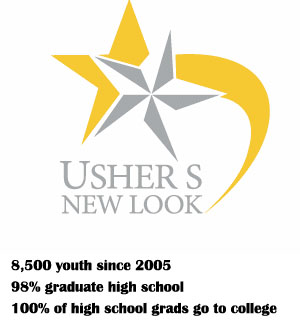
Congress and the Mindanao
Q: What were your most memorable experiences with New Look?
A: Probably a tie between testifying to Congress and the international trip to the Philippines.
Just to testify to Congress and have that platform for my perspective to be shared, to be listened to and respected ... (trails off).
My position on the panel was to tell Congress why programs like New Look work. So, I felt like I was not only telling my story but I was telling the story of millions of kids across the nation.
I felt like I had to represent them in the best way I could. There was a lot at stake. After we testified to Congress we were invited to the White House for dinner. We discussed issues and perspectives with people who work closely with President Obama. I went to the inauguration and one of the inaugural balls as well. It was really nice.
The Philippines was my first international trip.
When you think you have it bad where you are, and then go somewhere where people have it worse, but they're happy, it makes you so appreciative of the things we take for granted. I was so inspired.
Those people deal with so many problems over there. From the rebels to the syndicate -- they're running the streets and the government -- so when the people have a problem they can't always call the police because the syndicate is running them. I can't remember how many people had gotten slaughtered, like the Mindanao, right before we came there.
We went to Mindanao to hear how the people are dealing with that. They are not giving up hope. They still want change. It was a real inspiring trip because I'm all for the underdog.
They didn't give up hope and they're still pushing and striving. And that motivated me to come home and do everything I'm doing times 10.
That trip was eye-opening and showed just how good we have it over here.
Future for New Look
Q: What would you like to see in the future for New Look?
A: I'd like to see more of these leaders we're creating. Because that's what we're doing, creating everyday leaders and global leaders. Movers and shakers. People who get things done.
I want to see more of the New Look efforts publicized.
I feel like everyone should know about the work we're doing because there's not too many organizations doing life work. And when I say "life work," the work we're doing is changing people's lives.
Just by my own involvement in New Look and going a different route, it created a ripple effect ... not only in my life, but all the people who are around me who got inspired and are still pushing and grinding for something positive. Sometimes it does take someone else doing something to push you to do it. And that's what's happening in all of our target cities. And now we're on an international level. Change is happening, but the people must know about it.
About Usher's New Look
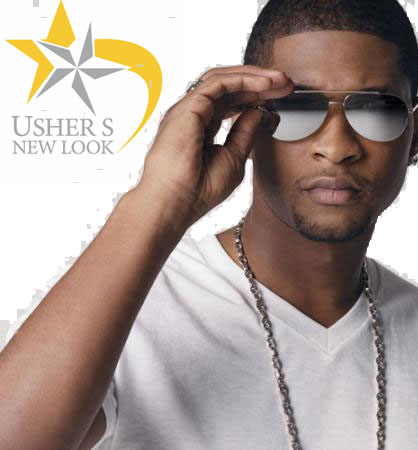
Usher
Each year, New Look receives an average of 100 applicants for its 30 available slots in each city where it operates: Los Angeles, Milwaukee, Detroit, Cleveland, Atlanta and New York are some of the regions. See website for complete list.
Through a pipeline model, New Look finds youth who are ready to make a change in their lives. Within that pipeline are community churches, schools, Boys & Girls Clubs, YMCA and other organizations. Using Cisco telecommunications, New Look youth leaders also engage in training with youth in Kenya.
"We see our youth as the leaders, the 10 percent who will lead 90 percent of their generation," says New Look CEO Shawn Wilson. "They get an opportunity to train other youth and take a real leadership role in their communities."
Youth anywhere are invited to access New Look's micro-grant service, which encourages youth to make a difference by submitting ideas to PoweredByService.org and apply for a grant of up to $500 for local projects.
New Look Entrepreneurship / Opportunity
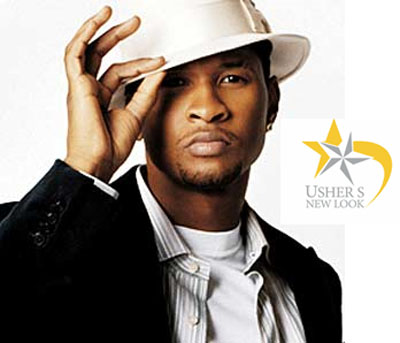
Usher
Wilson says the foundation is committed to investing in youth as leaders in their community. His challenge is to help youth develop the passion that already exists within them and transform it in a positive manner that leads them, and ultimately others, along a productive path. A part of that leadership is education and understanding the world of business.
"By investing in youth now, we help them become that next generation of small business owners who turn into large business owners that turn into institutions in the corporate community," says Wilson. "Our four pillars help youth understand that if you have a talent in mathematics, you have a talent in technology, not only can you use that talent to create apps, but you can create apps that provide a benefit to the community as well. So you're able to serve your community, better yourself and have it all simultaneously."
Usher's New Look recognized the achievement of one of its first leadership academy graduates Chantia Robinson (currently pursuing masters at Georgetown University) last year in a ceremony that boasted a number of honorees, like singer Justin Bieber and former President Bill Clinton.
"We've learned that if you start with their talent, that's what will hook them and keep them engaged," says Wilson. You're not trying to force your views or put them in a box. You're really encouraging them to use their creativity and talent to step up to the plate as leaders.
"We're translating their passion and helping them to understand how their passion can not only be the launch pad for their business ventures and success in corporate America, but also it can be their springboard into giving back to their community. If you look at Usher, that's how he has set up his life."

